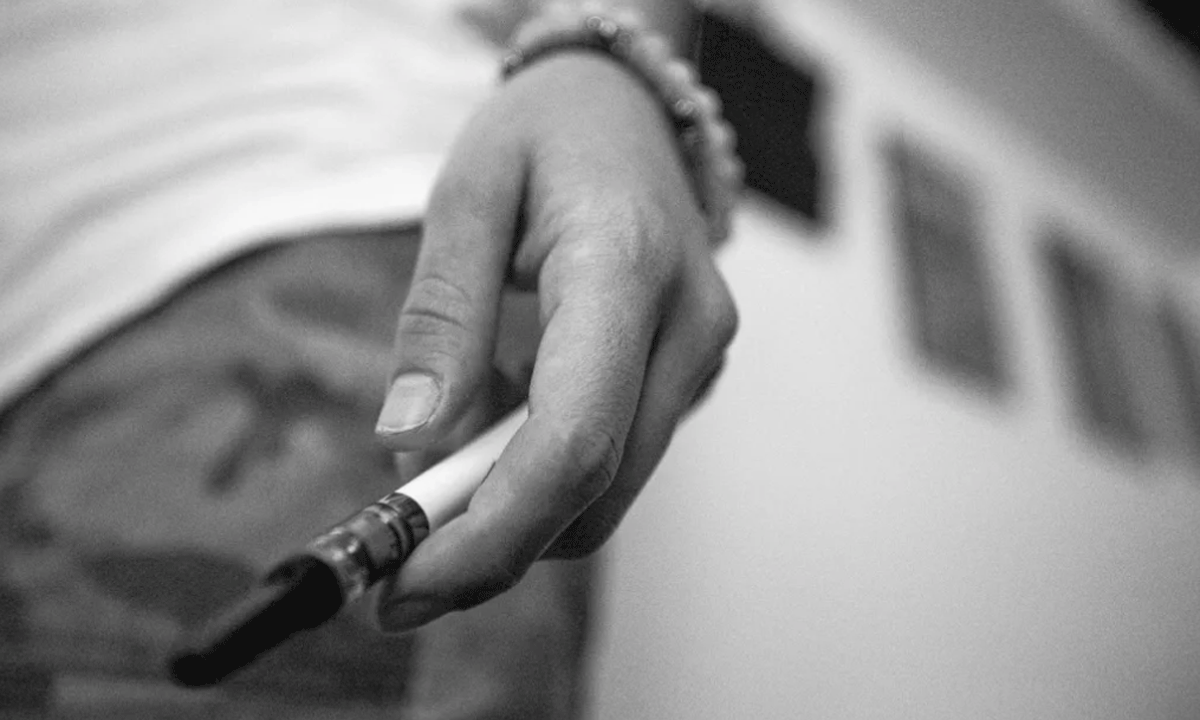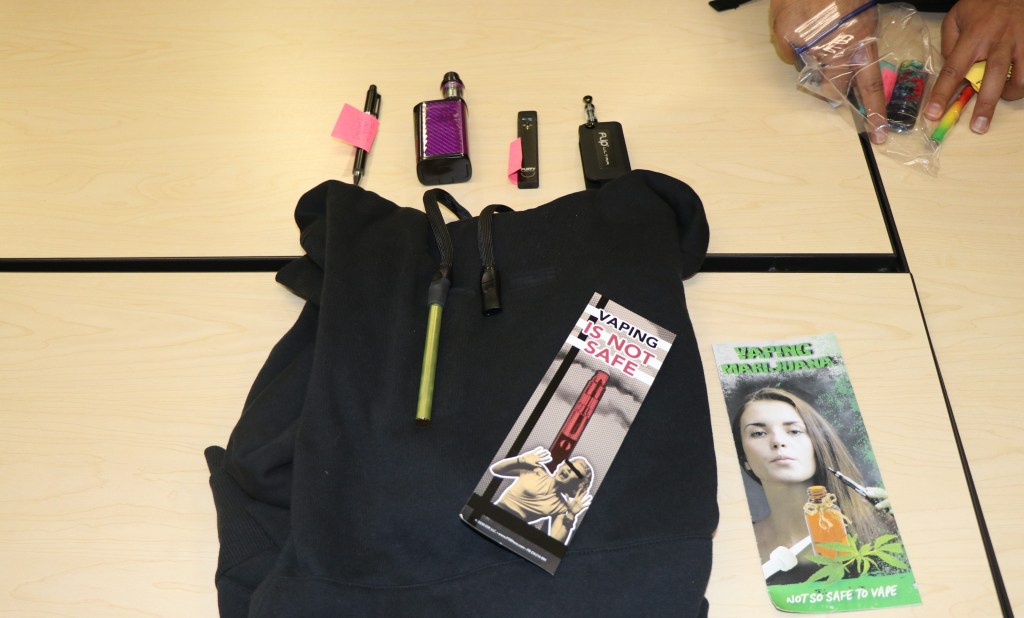Turning the Tide on Juvenile THC Vaping Arrests in Texas
The number of juveniles facing criminal charges for possession of THC concentrates – a felony in Texas – has skyrocketed in recent months.

Get stories like this delivered straight to your inbox. Sign up for The 74 Newsletter
Kids and teens across El Paso have found that small cylindrical and flash drive-looking devices containing THC — the psychoactive component in marijuana that produces a high — are easily tucked away in pockets and under sleeves, allowing them to inconspicuously take a drag wherever they go.
As a result, the number of juveniles facing criminal charges for possession of THC concentrates – a felony in Texas – has skyrocketed in recent months.
With arrests continuing to mount, there have been some efforts in turning the tide.
In the last of a four-part series about the rise of vaping THC among minors, El Paso Matters examined some of the emerging research on youth cannabis use prevention; how health organizations have tried to stop kids from using the drug before they can get in trouble; and the recent attempts to change the laws and penalties that come with possession of THC concentrates — which some experts say may be doing more harm than good.
“Once you have a kid involved in the criminal legal system, it stays with them forever,” Andreea Matei, a policy associate with the Urban Institute’s Justice Policy Center told El Paso Matters. “It impacts employment, it can impact access to funding and support during education and secondary education. It impacts their ability to find housing sometimes. So it really sets them up in a way for failure.”

The Urban Institute is a Washington, D.C.–based policy research think-tank that has conducted several studies on juvenile justice reform.
“Punitive measures are not effective,” added Dr. Bonnie Halpern-Felsher, professor at the Stanford University School of Medicine Department of Pediatrics. “The best method is to support them into not using again. Support them in not becoming addicted and getting off of that cannabis. … So don’t bust them. Don’t put them in jail.”
Studies on adolescent development have found that some of the strict methods used in the juvenile justice field for decades, such as probation or juvenile detention, have failed to stop minors from reoffending.
In response, Matei said there has been a call to change these methods to focus on treatment, education and behavior change “rather than punitive measures for the sake of accountability” through community resources and services.
In El Paso, local lawmakers have already made some efforts to reduce the punishments that come with marijuana and THC possession charges.
In May 2020, the El Paso City Council approved a cite-and-release program, which allows police officers to give a ticket instead of arresting someone who is caught with marijuana. The program does not apply to THC concentrates like those commonly found in vaping devices.
Then in late 2022, the El Paso County Commissioners Court also created a specialized diversion program for minors charged with possessing THC for the first time. The program connects juveniles with resources from local organizations, including Aliviane, a local mental health and addiction treatment organization, and El Paso Center For Children, a children’s health center.
It also allows them to get their records sealed after completing counseling sessions and passing a drug test.

Research shows that these types of programs may be successful in lowering recidivism rates among youth.
One study looking at the outcomes of 73 diversion programs in the U.S., Australia and Canada found that minors who took part in a diversion program were 24% less likely to get in trouble with the law again in the future.
In Florida, a statewide data analysis found that youth who were issued civil citations as part of a diversion program instead of being arrested had a 4% recidivism rate, while their peers who were arrested had a 9% recidivism rate.
Still, diversion programs can have varied methods and outcomes, and local drug-use prevention advocates say it is too early to tell if the program in El Paso will be successful in lowering THC-related arrests among minors.
Though these efforts have lessened some of the punishments that come with marijuana charges or THC possession in El Paso, some of the long-term consequences that come with a criminal record may remain. If left unsealed, a felony can affect a person’s ability to get certain jobs, qualify for financial aid and apply for housing. Sealed records can also be accessed in some rare cases if the person is charged with a serious crime again in the future.
It would be up to the state to change the law and lower the severity of the charges –something one state lawmaker attempted to do during the 2023 legislative session.
Texas state Rep. Joe Moody, D-El Paso, introduced House Bill 218, which would have reduced the penalties for possession of small amounts of THC concentrate from a felony to a Class C misdemeanor, among other changes. The bill would have also required law enforcement to issue citations instead of making arrests for marijuana possession, and allowed first offenders to have their charges expunged, essentially destroying any record it ever happened.
The bill passed through the House but was never scheduled for a hearing once it reached the Senate State Affairs Committee. Lawmakers will likely have to wait until the next legislative session in 2025 before another similar law can be introduced.
Legislators in New Mexico, where marijuana is legal for adults 21 and over, have already gone even further to limit penalties for minors caught with the drug.
In 2021, the governor of New Mexico signed a law that eliminated fines for juvenile offenders convicted of marijuana possession, which lawmakers say hurt economically disadvantaged families. Now in New Mexico, if a minor is caught with a THC vape pen, they would only be required to complete community service.
“These fees are disproportionately painful for lower-income families,” said Gov. Michelle Lujan Grisham in a news release at the time of signing the bill. “Nickel-and-diming New Mexico families doesn’t solve anything. On the contrary, it can create a vicious cycle of fee collection and license revocation, all of which serves only to entrap too many New Mexicans in the criminal justice system. Instead, we need to be looking at ways to reduce the administrative burden on families and reduce the potential for recidivism.”
Preventing THC Use: No Silver Bullet
As vaping has become one of the most popular ways for young people to consume marijuana, some local drug prevention organizations have been trying to stop them from using THC before they get a chance to get into legal trouble.

This includes groups like the Paso del Norte Health Foundation and the El Paso Advocates for Prevention Coalition, which consists of parents and representatives from various sectors like law enforcement and schools.
These groups have put on presentations and attended community events to reach out to parents, teachers and youth, with the primary focus on educating them about the harms of marijuana use and vaping.
While studies show that using factual information about cannabis use can help prevent cannabis use among minors, some experts have suggested that just focusing on just the negative side of marijuana use can be ineffective.

“Adults are using cannabis to fall asleep, to be happy … they’re using it for some perceived benefit,” Halpern-Felsher said. “If you only talk to teens about the bad, teens don’t listen. … And the problem is you lose your audience, you lose your voice if you don’t give a balanced perspective.”
Halpern-Felsher founded the Cannabis Awareness & Prevention Toolkit in 2019 to provide resources for educators, parents and community organizations meant to prevent middle and high school students from using marijuana. The program was modeled on the nationally recognized Tobacco Prevention Toolkit and uses similar strategies while addressing some of the complexities around marijuana use as laws and research around the drug are constantly evolving.
In some cases, these types of prevention programs are being directed to minors who have already tried marijuana at least once and may not be as receptive as their peers.
“When you’re teaching cannabis or tobacco or drug prevention in the classroom, you’re going to have anywhere from 10% to 40% of the class who have already used some form of drug,” Halpern-Felsher said. “If you tell teens, ‘Never use it, it’s bad and if you do, this is what’s going to happen,’ students in the class who have used also shut down.”
One Florida-based program, Prevention Plus Wellness, has opted to focus on promoting a healthy lifestyle and educating young people on how marijuana and drug use can affect that.

“The program focuses on positive images,” said the organization’s founder Dr. Chudley Werch. “We set aspirational goals to get a little bit more physical activity or eat a piece of fruit or get another 30 minutes of sleep while also pledging to avoid substance use, which is counterproductive to a healthy lifestyle.”
With all the complexities that come with marijuana, some said it may take a multifaceted approach to stopping kids from using it.
“There’s no silver bullet,” Werch said. “Our program will work for many youth but not all, and that goes with any kind of a prevention strategy.”
Other organizations have begun trying to understand why young people use marijuana to develop new approaches on how to stop them from using it.
In one California study on adolescent cannabis use, researchers observed that some of the main reasons young people use marijuana are to bond with peers, deal with social isolation and cope with mental health issues — factors that were exacerbated by the pandemic.
“Some of our participants really did talk a lot about how the COVID-19 pandemic had just exacerbated challenges to their daily routines. It has increased feelings of isolation, and really they’ve seen a negative impact on themselves,” said Shiloh Beckerley, vice president of research and evaluation for Rescue Agency, during a presentation on the study in 2022. “One tween stated to me, ‘Every day was literally the same. I couldn’t do anything. We were doing school on Zoom. I just stayed in my bed all day.’ So you can imagine that there could really increase that sense of social isolation.”
The study, which involved interviews and focus groups with youth and parents, was conducted by Rescue Agency, a marketing company that creates public health campaigns, on behalf of the California Department of Public Health.
These researchers found that many teens who already used marijuana said they began using more during the pandemic and believed it helped them deal with anxiety and depression, though research suggests it may actually exacerbate it.
The study also examined young people’s receptiveness toward different types of cannabis prevention messages.
Youth told researchers they wanted to hear in-depth and scientific information about why cannabis impacts the brain from a credible and trustworthy source. Teens often identified peers with personal experience with cannabis as trustworthy sources, according to the study. Older teens also said they wanted to hear nonjudgmental information and were turned off by ads they felt were talking down on those who use marijuana.
Many also said they were concerned about potential changes to their brain and personality, and cited this as the main reason they have either never tried or want to stop using marijuana.
This is the last in a four-part series on THC vaping among minors. Find the first story HERE, the second HERE and the third HERE.
This article first appeared on El Paso Matters and is republished here under a Creative Commons license.![]()
Get stories like these delivered straight to your inbox. Sign up for The 74 Newsletter

;)